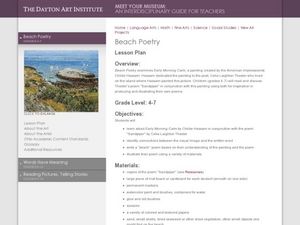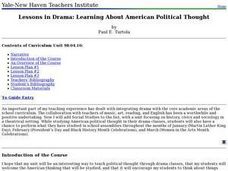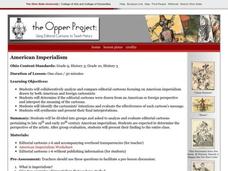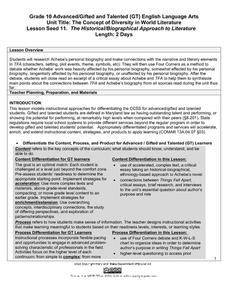Curated OER
Cartoons for the Classroom: Celebrating the 19th Amendment
Eighty-eight years after women earned the right to vote, a women ran for president. Young analysts consider the role women play in politics, how they are portrayed, the standards they are held to, and if they are still treated unfairly...
Curated OER
Lesson: Taking Risks & Making Comparisons
Kids are asked how an Indian mandala was made. They devise a hypothesis and then use colored sand to test if their guesses were correct. They document the experience, examine a mandala, and write a comparative piece about the differences...
Curated OER
Beach Poetry
Familiarize young analysts with the relationship between words, meaning, and visual images. They consider the relationship between the painting Beach Poetry and the poem Sandpaper. They compose and illustrate an original a beach poem...
Curated OER
Teaming Up on Health Care
Use this political cartoon handout to help pupils understand the role the Blue Dog Coalition plays with regard to Health Care Reform. Football is used metaphorically to represent a player (Blue Dogs) tackling someone on his team (Obama)....
Curated OER
Cartoons for the Classroom: Berryman, Roosevelt, and the Teddy Bear
Do your historians know the story behind the teddy bear? Background information clues learners in to the context of a political cartoon, which depicts Teddy Roosevelt on his famous hunting trip. They will read about renown cartoonist...
Curated OER
Seneca Falls Convention: Declaration of Sentiments
The Seneca Falls Convention was an amazing outlet for the female voice during the time of women's suffrage. Learners will read a short, but powerful excerpt from the Declaration of Sentiment, as spoken at the convention. They'll answer...
Media Smarts
Facing TV Violence: Consequences and Media Violence
Make your class aware of the difference between media violence and real violence. Using prior knowledge, a video clip, and a worksheet, class members explore and discuss the unrealistic portrayal of violence in the media. Learners...
Curated OER
Who Freed the Slaves During the Civil War?
Pose the question to your historians: who really freed the slaves? They critically assess various arguments, using primary sources as evidence. In small groups, scholars jigsaw 5 primary source documents (linked), and fill out an...
National History Day
“War Is Hell. We Know it Now.” American Soldiers in the Meuse-Argonne Offensive
Understanding the soldier's experiences during World War I sometimes takes a newscast. Learners see the importance of understanding multiple points of view with a newscast project surrounding the Meuse-Argonne Offensive. Compare and...
Curated OER
Colonialism in Africa
Students examine Africa from a regional perspective. They appreciate the historic and geographic relationships that unite and divide the regions of Africa. Students create a comprehensive document outlining problems in the assigned...
Curated OER
Lessons in Drama: Learning About American Political Thought
Students develop critical thinking skills so that they may produce their own written plays or music from their thoughts and feelings. They express their thoughts based on what has been presented to them over the duration of the course.
Curated OER
As a Bird Flies or as a Submarine Dives...
In this geography worksheet, students look critically at a map containing a variety of different directions. Students answer 2 short answer questions regarding giving someone the best directions from point A to point B.
Curated OER
Lift Every Voice and Sing
Students analyze sculpture, poetry, and music to gain an understanding of historical events. In this critical thinking skills lesson, students take a closer look at African-American history as they examine "Lift Every Voice and Sing'"...
Curated OER
The Electric Hearth
Students examine popular media. In this media awareness lesson, students keep logs of their interactions with media and then write an essay regarding the data.
Curated OER
The Economic Way of Thinking - About Everything
Learners write their definitions of economics on index cards and revise them as the lesson continues. They discuss the principles of economic reasoning and after completing a quiz, use economic reasoning to solve "real life" mysteries.
Curated OER
Excerpt from Elizabeth Gaskell's Mary Barton (1848)
Answering document-based questions is a great way to build reading comprehension and critical thinking skills. Learners read an excerpt from Elizabeth Gaskell's Mary Barton, then answer two related questions.
Curated OER
Neolithic Revolution
Use the provided passages on the Neolithic Revolution to answer 2 critical-thinking questions. Passage one is informational and describes benefits that came from the Neolithic Revolution. Passage two is a first person narrative from a...
Curated OER
Sima Qian: Records of the Grand Historian
Print this resource and activate prior knowledge about Ancient China. This page includes a quote from Sima Qian and two critical thinking questions related to the dynastic system in China.
Math Warehouse
Theoretical Probability Activity
If you keep rolling a die, you'll roll a five exactly one-sixth of the time—right? A probability lesson prompts young mathematicians to roll a die 100 times and use the data to calculate empirical probabilities. They then compare these...
Curated OER
American Imperialism
Critical analysis skills can be built in a variety of ways. Using editorial cartoons (both domestic and foreign) learners will consider how American Imperialism was perceived during the late 19th century. Critical thinking questions,...
National Constitution Center
Born in the U.S.A: Music as Political Protest
Though often used in shows of patriotism, Bruce Springsteen's 1985 song "Born in the U.S.A." is critical of America's role in the Vietnam war and its treatment of American veterans. High schoolers analyze the song's lyrics in an activity...
Chicago Botanic Garden
Are Global CO2 Levels Changing?
According to the Mauna Loa observatory, carbon dioxide levels increased by 3 ppm in our atmosphere between 2015–2016. Individuals analyze carbon dioxide data from around the world and then share this with a home group in lesson three of...
ReadWriteThink
What is Poetry? Contrasting Poetry and Prose
Introduce middle schoolers to the different strategies used when reading prose versus poetry. Groups use a Venn diagram and a poetry analysis handout to compare the characteristics of an informational text and a poem on the same subject...
Maryland Department of Education
The Concept of Diversity in World Literature Lesson 11: The Historical/Biographical Approach to Literature
How affected is Thinks Fall Apart by Chinua Achebe's personal biography? Using a four corners strategy, and evidence from their readings, class members debate the degree of biographical influence in Achebe's novel.

























